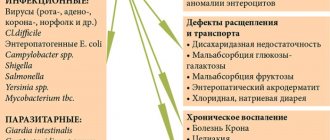Digestive problems in children are not uncommon and can be caused by a variety of factors. Therefore, when a child has diarrhea and vomiting, parents should know what to do, first of all, because these are serious symptoms. If you are not a doctor and do not know for sure how to act in such situations, then it is categorically not recommended to take everything under your control, otherwise this could result in serious complications for the child in the future; the first thing you need to do is call an ambulance.
What is it and how often does it happen
An intestinal infection is a disease that develops when viruses or bacteria enter the body and is manifested by diarrhea, vomiting, fever, weakness and dehydration.
According to WHO data for 2022, rotavirus infection accounted for 60% of cases of severe diarrhea in children under 5 years of age, and most of them were under one year of age. When the first symptoms appear in young children, it is necessary to seek medical help - up to 200 thousand children still die from rotavirus infection every year in the world, especially in developing countries.
How and when can you become infected?
Sources of rotavirus infection can be a sick child or an asymptomatic carrier. The virus is excreted from the body in the stool and gets onto household items, clothing and food with dirty hands.
Doctors often call rotavirus infection a “dirty hands” disease.
A healthy child can introduce the virus into the body first by touching things, and then by touching the face, and also by eating unwashed vegetables and fruits.
Rotavirus outbreaks typically occur in winter, early spring, or late fall because viruses persist in the environment longer at low temperatures. In summer, food poisoning occurs more often - the cause is usually bacterial contamination of food, and bacteria multiply better in the hot season.
First aid for child poisoning
Parents should be able to provide first aid to their child in case of poisoning before the ambulance arrives. This will help prevent the absorption of the toxic substance and reduce intoxication.
In case of poisoning with mushrooms, berries or medications, it is necessary to induce vomiting in the child by pressing on the root of the tongue. Rinse the stomach with a warm solution of table salt (2 - 4 teaspoons of salt per 1 glass of water) until the rinsing water is clean. The volume of liquid for gastric lavage should not be more than 3 liters.
What to give a child if he is poisoned?
After gastric lavage, enterosorbents are introduced inside to absorb the remaining poison.
They should be used as first aid for any food poisoning! But at the same time, it is necessary to know the permissible dosages and the preferred dosage form of the sorbent. For example, traditional activated carbon can damage the stomach lining of young children.
Modern silicon-containing sorbents (for example, Enterosgel) have high sorption activity, are available in gel form and are successfully used in pediatrics. Enterosgel absorbs not only pathogenic bacterial cells, but also their toxins, secondary mediators of inflammation, does not linger in the digestive system, is not absorbed, is suitable for long-term therapy and does not stain the stool, which is especially important during diagnosis.
What happens when a virus enters the body
With food or saliva - if a child licks his dirty hands - rotavirus enters the mouth, then into the stomach and intestines. There it penetrates the cells of the superficial layer lining the intestines from the inside and damages them. Unlike bacteria, viruses do not lead to significant inflammation of cells; they disrupt the functioning of the body's enzyme systems to a greater extent.
Carbohydrates stop being broken down and accumulate in the intestines - the balance of fluid, potassium and sodium in the body is disrupted. A lot of water, electrolytes, organic acids and carbon dioxide collect in the intestine, which normally should not be there. Because of them, vomiting and diarrhea begin and gas formation increases. At the age of up to 5 years, intestinal cells are not yet mature enough - rotavirus affects up to 2/3 of them, so children get sick more often and more severely than adults.
Most often, the first symptom is vomiting. It occurs simultaneously with or precedes diarrhea and usually lasts 1-2 days. The stool is usually watery, foamy, yellow in color with a small amount of mucus. In infants it can occur up to 20 times a day. The duration of diarrhea is on average 3-7 days, but there are cases of up to two weeks - usually in children under one year old. Sometimes the infection begins with a fever of up to 38-39 ° C, symptoms of ARVI - cough, runny nose, sore throat. Children can also refuse to eat and literally collapse.
What types of diarrhea are there?
Sometimes diarrhea does not affect the general condition of the baby.
Today, doctors actively use several generally accepted classifications of a disease such as diarrhea.
Among them, three popular systems can be particularly highlighted.
Let's look at each of them in a little more detail. Grouping by type (cause) of disease:
- infectious;
- nutritional;
- toxic;
- dyspeptic;
- medicinal;
- neurogenic;
- functional, not associated with disorders of the gastrointestinal tract.
Classification depending on the mechanism of development of the disease:
- Hyperosmolar diarrhea, characterized by significant impairment of the absorption of fluids through the intestinal wall.
- Hyperkinetic diarrhea resulting from increased peristalsis of the intestinal muscles.
- Exudative diarrhea, which is a natural consequence of inflammatory processes occurring in the gastrointestinal tract.
- Secretory diarrhea caused by excessive amounts of water, with sodium salts dissolved in it, penetrating into the intestinal lumen.
Typing diseases based on the duration of their course:
- acute (lasting no more than 3 weeks);
- chronic (more protracted).
What to do to avoid getting sick
Frequent and thorough hand washing with soap is the prevention of any viral and bacterial infections.
- You need to teach your child to do this from an early age: after going outside and going to the toilet, before meals, and just several times a day.
- Parents should wash their hands themselves before touching or feeding the baby.
- It is important to wash vegetables and fruits before eating, observe temperature conditions when preparing food, and drink boiled or bottled water.
The largest amount of virus is excreted in the stool in the first 5 days of illness, so during this period you need to wash your hands more often and wet clean your home.
Vaccination against rotavirus
There are two vaccines - the Belgian Rotarix and the Russian RotaTek. Only RotaTek is registered in the Russian Federation. It contains the 5 most common strains. Vaccination against rotavirus infection is not included in the national vaccination schedule, but it can be done at the request of parents. RotaTek has strict age restrictions and intervals between revaccinations - be sure to consult your pediatrician.
“The effectiveness and safety of vaccines against rotavirus infection, subject to age limits, has been confirmed in many studies,” says Elena Kolganova, a pediatrician at the Fantasy children’s clinic. — After receiving the third dose of the vaccine, the number of hospitalizations decreased by 100%, and visits to the clinic decreased by 96%. Rotavirus, unlike influenza, rarely mutates, and therefore vaccination does not need to be carried out every year - immunity lasts up to three years.”
How to help your child
Pediatrician and infectious disease specialist at the GMS clinic Daria Zakharova reminds that the infection in different children can occur in different ways: for some - in the form of mild malaise, decreased appetite with minor abdominal discomfort and a single loose stool, for others - with fever, repeated vomiting and severe diarrhea.
“The parents’ actions largely depend on the severity and age: where to turn for help. If a child feels sick every hour and complains of severe abdominal pain, then you need to call an ambulance, which will take him to the hospital, where the cause of the pain will be determined. In all other cases, you need to call a doctor,” emphasizes Daria Zakharova.
In children over five years of age, the infection is usually milder, so you can help them on your own.
“You need to start with drinking plenty of fluids to replenish the fluid deficit - what the child loses with vomiting and diarrhea,” says Elena Kolganova. There are special formulas for calculation, but usually 50-100 ml of water per kg of body weight per day is required, i.e. if a child weighs 30 kg, then with rotavirus infection he will need from 1.5 to 3 liters of liquid per day. It is better to use a special pharmaceutical solution: for children it should contain a minimum of salt and sugar. You need to give your child water often and little by little - 10-15 times an hour, 2-3 sips.”
Hiccups
How does it express itself?
In the first months of life, almost all children hiccup; moreover, the baby begins to hiccup in the womb. Simply due to the contraction of the diaphragm separating the abdomen and chest cavity, the baby’s breathing is impaired. As a result, it makes a characteristic loud sound. There's no need to worry. As a rule, hiccups go away within 10 to 15 minutes.
Causes:
- Thirst - the baby’s mucous surface of the mouth and digestive canal dries out;
- Strong emotions - a child may be frightened by a loud sound, a sudden flash of bright light or an unexpected touch;
- Overeating - food, stretching the ventricle, causes contraction of the diaphragm.
How to help your baby:
- Don't overfeed;
- If hiccups prevent your baby from sucking or falling asleep, you can give him some warm boiled water or baby herbal tea;
- If, as a result of hiccups, the baby burps and then continues to hiccup, hold him vertically in your arms for several minutes until breathing is restored. Do not place your baby on his or her back in the crib immediately after eating.
What are the dangers of rotavirus without treatment?
Diarrhea and vomiting cause the body to lose a lot of water along with sodium, potassium, magnesium and other electrolytes. This leads to disruption of the lungs - the child begins to breathe frequently and shallowly; the heart and blood vessels - the heart rate increases, blood pressure decreases; and the brain - dizziness, headache, and weakness appear.
In infants, rotavirus infection is most dangerous because convulsions or loss of consciousness can occur as a result of the loss of large amounts of fluid and electrolytes. It is very important to immediately call an ambulance at the first signs of an intestinal infection in infants.
Gas in newborns
What is expressed in
Bloating is characterized by the accumulation of large amounts of gas in the intestines and occurs much more often in children than in adults. As a result, the baby cries loudly and pitifully, and his tummy seems larger than usual.
Causes:
- The baby's intestinal microflora is not yet fully formed;
- Improper nutrition of a nursing mother - cabbage, pickled vegetables, black bread, onions, leeks and beans can cause the formation of gases in the baby's intestines;
- Gas formation occurs in children who are put to the breast too often - every hour and a half (this does not apply to infants in the first weeks of life);
- Feeding with unadapted and improperly diluted milk formulas (in the absence of breastfeeding);
- Swallowing air during feeding.
What you can do:
- Review the diet of the baby or mother;
- Massage the tummy clockwise;
- Place the baby on the mother's belly;
- Apply a warm diaper or woolen scarf to your tummy;
- A gas outlet tube helps remove gases from the tummy - it should not be inserted too often and very carefully, after lubricating it with oil, to a depth of no more than a centimeter;
- If such stomach upset becomes prolonged, it is better to consult a doctor.
How to help the body recover
“Previously, there was an opinion that if you have a rotavirus infection, you should not consume dairy products,” says Elena Kolganova. — Now scientists have revised their opinion on this matter: if a child is breastfed or formula-fed, then nothing needs to be changed. For adult children, it is advisable to remove fresh fruits and vegetables, as they enhance peristalsis and fermentation processes in the intestines.”
If a child has a temperature above 38.5 ºС, you can give him antipyretics, and in case of severe pain - antispasmodics. You should not give painkillers - this will mask the symptoms and it will be difficult for the doctor to make a diagnosis. You should not rinse your child’s stomach - this will increase vomiting and lead to extreme dehydration - loss of consciousness, convulsions.
“Treatment of uncomplicated rotavirus infection is symptomatic: the main thing is to drink plenty of fluids. Vomiting and loose stools usually go away on their own. However, taking probiotics can speed up the recovery process; their administration is safe and quite effective,” says Daria Zakharova.
It is always easier to prevent a disease than to treat it - observe the rules of personal hygiene and teach your children to do the same, wash fruits and vegetables and do not drink tap water.









